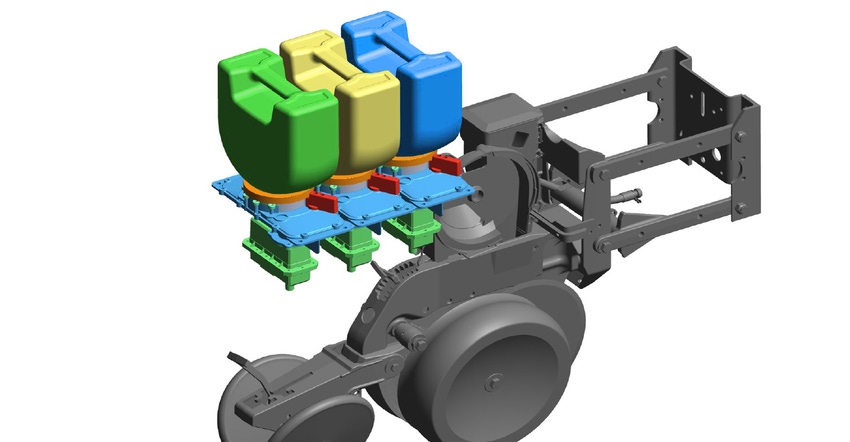September 22, 2017

Herbicide, fungicide and insecticide application is undergoing constant innovation, but one area that's getting more attention is in-furrow at planting. Amvac, the innovator that brought smart-box technology to market, is aiming for a new approach that would allow application a range of products in one pass. The tech is SIMPAS, which is an abbreviation for Smart Integrated Multi-Product Prescription Application System.
Think of the system as a kind of heavy-duty cartridge approach to putting down multiple products in a single pass. Each of those "cartridges" is, in fact, a 2.5-gallon, product-filled container. The container itself has as much tech as the material inside, according to Rick Rice, Amvac director, application technology.
"The system uses similar software to what inkjet printers use," Rice explains. And right now the machine works with granular products, though Rice tells Farm Progress that work is well underway to bring liquid application to the product, too.
"Our vision is for a farmer to apply a combination of dry and/or liquid product across a broad portfolio of materials, including micronutrients, nematicides, fungicides and insecticides," Rice says.
Each of those jug-type cartridges in SIMPAS has a radio frequency identification tag, or RFID, unit that connects with the application system to track how much product is in the jug and how much is applied. When in use, the jug essentially "talks" to the application unit reporting product used. When a farmer finishes, the RFID tag has measured not only what's applied, but also what's left in the jug.
For your dealer, that brings new opportunities. Say you apply your last field with an insecticide, a fungicide and a nematicide. The set of three jugs per row unit can be returned to the dealer. "This is a closed system, so the dealer can redeploy those jugs," Rice says. "And we're working on a refill system for dealers to use to fill those jugs."
Rice noted that the smart-box system requires dealers to ship those units back to a central location for refilling. SIMPAS could eliminate that step, which could be a benefit for dealers. "Today, with the smart-box system, those boxes have to be empty when they're returned to the dealer," Rice says. "With SIMPAS, that requirement is gone."
Prototype and the future
Rice explains that the system is still under development. Trimble has signed an agreement to be the sole global marketer of SIMPAS when it is available for farmers. Under the agreement, the Trimble Vantage distribution network will facilitate easy installation and servicing of the SIMPAS technology in North America and other global markets.
As for real-world use, the tech is now limited to three of those RFID "cartridges" per planter row. "We do have some weight limits to this system, at this time," Rice says. "There's only so much weight you can put on individual planter row units."
The cartridge size will be the next formulation challenge for Amvac and others that want to apply through the system. Formulations that are highly concentrated will do best to allow the planter to run in the field longer. The computer graphic with this story shows an early design iteration of the system, but in the end, those jugs may look more like those 2.5-gallon jugs familiar to many dealers and farmers. That remains to be seen.
"The greatest value of the SIMPAS platform is that it will be easy for farmers to prescriptively apply during the planter pass," he says. The ability to swap in different products quickly during planting will also help with planter tending speed and productivity.
For more information, visit american-vanguard.com.
About the Author(s)
You May Also Like






